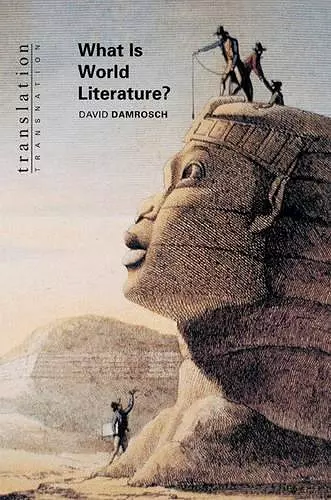What Is World Literature?
Format:Paperback
Publisher:Princeton University Press
Published:15th Apr '03
Should be back in stock very soon

A stunning achievement. Damrosch gives 'world literature' the largest possible scope--ranging from cuneiform to hieroglyphics, from low German to Nahuatl--a jaunt across several millennia and a dozen languages. -- Wai Chee Dimock, Yale University Displaying great intelligence, immense literary and historical culture, and unassuming modesty, Damrosch intervenes in contemporary debates over 'world literature.' Readers will be dumbfounded by his range. He treats cuneiform-inscribed shards, Egyptian hieroglyphics, medieval German female mystics, Inca chronicles, Kafka translations and contemporary Native protest literature will equal philological attention, poise and erudition. -- Wlad Godzich, University of California, Santa Cruz
Probes the uses and abuses of world literature in a changing world. This book looks at the ways works change as they move from national to global contexts. It argues that world literature is work that gains in translation.World literature was long defined in North America as an established canon of European masterpieces, but an emerging global perspective has challenged both this European focus and the very category of "the masterpiece." The first book to look broadly at the contemporary scope and purposes of world literature, What Is World Literature? probes the uses and abuses of world literature in a rapidly changing world. In case studies ranging from the Sumerians to the Aztecs and from medieval mysticism to postmodern metafiction, David Damrosch looks at the ways works change as they move from national to global contexts. Presenting world literature not as a canon of texts but as a mode of circulation and of reading, Damrosch argues that world literature is work that gains in translation. When it is effectively presented, a work of world literature moves into an elliptical space created between the source and receiving cultures, shaped by both but circumscribed by neither alone. Established classics and new discoveries alike participate in this mode of circulation, but they can be seriously mishandled in the process. From the rediscovered Epic of Gilgamesh in the nineteenth century to Rigoberta Menchu's writing today, foreign works have often been distorted by the immediate needs of their own editors and translators. Eloquently written, argued largely by example, and replete with insightful close readings, this book is both an essay in definition and a series of cautionary tales.
"What Is World Literature? has become a touchstone of every debate on the subject."---Alexander Beecroft, Modern Philology
ISBN: 9780691049861
Dimensions: unknown
Weight: 482g
344 pages